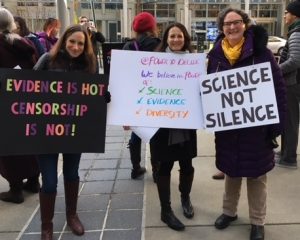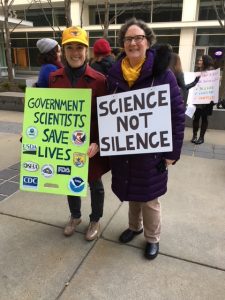We’re fully into Orwellian territory now. The Washington Post’s Lena H. Sun and Juliet Eilperin reported Friday evening that a group of CDC employees were told not to use seven words in official budget documents: “vulnerable,” “fetus,” “transgender,” “entitlement,” “diversity,” “evidence-based,” and “science-based.”
Twenty-four hours later, Sun and Eilperin followed up by reporting that another HHS agency received similar guidance about avoiding “vulnerable,” “entitlement,” and “diversity,” as well as instructions to use “Obamacare” instead of “Affordable Care Act.” Another linguistic substitution is visible at the State Department, where some documents now refer to “sexual risk avoidance” rather than “sex education.”
In a post at the Union of Concerned Scientists blog on Saturday morning, Michael Halpern wrote:
CDC research and initiatives have direct impact on public health and safety for all populations—including and especially those who are most vulnerable to public health threats. Effectively tackling public health challenges means being honest and open about risks and who faces these risks. To prevent the agency from losing its legitimacy, CDC Director Fitzgerald must speak up now to reinforce the centrality of science to the agency’s work.
On Sunday, STAT’s Helen Branswell reported that CDC Director Brenda Fitzgerald emailed the agency’s staff to assure them the CDC is still a science-based institution, and that Fitzgerald took to Twitter to “assure you there are no banned words at CDC.” Similarly, an earlier statement from HHS spokesperson Matt Lloyd called the idea of banned words “a complete mischaracterization.” Branswell notes that the responses don’t refute Sun and Eilperin’s reporting, though.

As far as I can tell, there is no edict stating that CDC employees cannot use these words anywhere – i.e., technically, there’s no ban. What employees have been told, according to Sun and Eilperin’s sources, is that certain words in certain documents are being flagged and sent back to CDC for corrections. Whether a word is banned or whether employees learn that using it will result in being told to revise the document in question, the end result is the same: Words central to advancing public health disappear from important documents.
Unacceptable alternatives
I’m sure CDC employees have access to thesauruses, but using imprecise language is not what scientists do. Some Trump administration officials would probably prefer that fetuses be referred to as “the unborn” (as they did in the HHS Draft Strategic Plan), but that’s not a medically accurate term. Likewise, “transgender” is the only accurate and appropriate term for the population it describes – a population that faces an increased risk for HIV and is the focus of CDC efforts in that area. “To pretend and insist that transgender people do not exist, and to allow this lie to infect public health research and prevention is irrational and very dangerous, and not just to transgender people,” said National Center for Transgender Equality’s Executive Director Mara Keisling.
There are plenty of different ways to discuss vulnerable populations and diversity, but telling scientists to avoid those terms seems to be sending a signal that the administration doesn’t care about eliminating health disparities – even though CDC plays a key role in achieving the Healthy People 2020 goal to “Achieve health equity, eliminate disparities, and improve the health of all groups.”
STAT’s Erin Mershon quoted the reaction from Planned Parenthood:
Dana Singiser, a vice president of public policy at Planned Parenthood, called the move “unimaginably dangerous” and said it would put “millions of lives in danger.”
“You cannot fight against the Zika virus, or improve women’s and fetal health, if you are unable to use the word ‘fetus.’ You must be able to talk about science and evidence if you are to research cures for infectious diseases such as Ebola,” she said. “You must be able to acknowledge the humanity of transgender people in order to address their health care needs. You cannot erase health inequities faced by people of color simply by forbidding the use of the words ‘vulnerable’ or ‘diversity.’”
Something else that set off alarm bells in the public health community was a suggested alternative (also reported by Sun and Eilperin) to using “science-based” or “evidence-based”: “CDC bases its recommendations on science in consideration with community standards and wishes.” This is a problem, because“community standards and wishes” often include certain communities’ wishes that sexual intercourse only occur between married, cisgender heterosexual couples, or that vaccinations be entirely optional.
At Quartz, Nikhil Sonnad collected examples of how CDC used these words in past budgets.
Responses
Despite the news breaking when the weekend was already underway, the response from those who support science public health has been swift. Branswell reported:
The Post published its story late Friday, setting off a firestorm of protest within the scientific community. The Association of Schools and Programs of Public Health said that if true, the edict was “an Orwellian attack on scientific integrity.”
In a letter to Mick Mulvaney, director of the White House Office of Management and Budget, the organization demanded that the policy be withdrawn.
“The reported policy flatly contravenes the mission of the agency, grossly violates the agency’s pledge to the American people, and represents an appalling act of censorship,” wrote Laura Magaña, president of the association. “Leaving this policy in place would disrupt the agency’s critical work and, as a result, threaten the health of U.S. communities across the country.”
The American Association for the Advancement of Science was quick to denounce the reported policy.
“Among the words forbidden to be used in CDC budget documents are ‘evidence-based’ and ‘science-based.’ I suppose one must not think those things either. Here’s a word that’s still allowed: ridiculous,” said CEO Rush Holt.
Science and democracy advocate Aaron Huertas fired off a letter to CDC’s Acting Director for Science, Captain Willian R. Mac Kenzie, MD, pointing out the ways in which the ban on these words contradicts the agency’s scientific integrity policy.

Several of us will be rallying early Monday morning outside CDC’s DC office to show our support for CDC employees and science that serves the public.
I’m sure there will be more developments in this and other aspects of scientific integrity at federal agencies. I hope the Trump administration will recognize the crucial role of our science-based health agencies and give them assurances that they are free to use scientific language appropriately.
